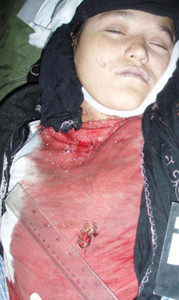By Maximilian Clarke
On a cold January afternoon last year, Qurban the bodyguard left his boss's house in Bamyan province, Afghanistan to buy some coal at the bazar. Qurban's boss was Wahidi Beheshti – governor of a remote district in Bamyan province – who had been allowing Qurban, his wife Soraya and her 16-year-old sister Shakila to stay at his home.
As Bamyan is among the more secure of Afghanistan's provinces, Qurban thought little of heading into town without his Kalashnikov. However, it was that sense of security that saw him return to Beheshti's house to find Shakila lying on the floor, barely conscious, bleeding to death from a single gunshot wound to the chest. Qurban's weapon, which the police later determined had fired the fatal shot, was leant against the wall on the far side of the room.
I heard all of this at the end of last month during a press conference organised by the Kabul-based NGO, Human Rights and Eradication of Violence Organisation (HREVO), which hosted Shakila’s brother, Mohammad Alam, Zahara Sepehr, director of the Afghan women and children's support organisation DSAWCO, and Aziz Rafi from Afghanistan’s Civil Society and Human Rights Network.
Wahidi Beheshti maintains that he played no part in Shakila’s murder, yet at the time of Shakila's death he refused to call the police and instead carried the teenager’s lifeless body to his car. However, according to Sepehr, the shot and the commotion that ensued alerted Beheshti's neighbours, who called the police.
Beheshti told the police that he was in prayer at the time of the murder and didn't even hear the gunshot, despite the fact that Soraya, Shakila's sister, heard it from outside, before rushing indoors to find Shakila unable to talk and barely able to move her limbs. "Despite the powerful 7.62 calibre round piercing Shakila’s heart and exiting through the back of her body, she managed to cling onto life for a full 20 minutes after the shooting," Mohammad Alam added.

Shakila's dead body drenched in blood. She was raped and killed in cold blood.
It should be noted here that Beheshti hails from a powerful family. His brother, Jamal Fakhul Beheshti, is an MP and his father was a warlord during the jihad against the Soviet invasion. He has used that power at every juncture in a bid to “wrap the matter up in whatever way possible”. According to Zahara, the court initially found the governor not guilty, citing the fact that not enough evidence was found in the initial police investigation.
However, after it emerged that the court was potentially under Beheshti’s influence, the case moved to a second meeting, where the governor tried to blame Qurban for the murder. "Wahidi," Mohammad Alam explained, "then contacted our family, saying that the only way Qurban could be spared jail was if they called Shakila’s demise a suicide."
At the second hearing, the judge ruled out suicide after observing the impossibility of a girl Shakila's size shooting herself in the chest with a Kalashnikov, before leaning it against a wall and walking across the room to die. Not a trace of blood was found on the weapon or anywhere else in the room.
Today, more than a year and a half after the incident, Beheshti is not only a free man, but remains in office despite prominent civil society groups and local media outlets pointing to his guilt. Even more depressingly, according to Aziz Rafi, there remained a strong chance of Beheshti ultimately walking away as a free man.
Rafi blamed “Afghanistan’s culture of impunity” among its leaders, reinforced by the population’s “lack of political will” as the chief barriers to justice. Abdul Wadood Pedram, Executive Director of HREVO, agreed: "In Afghanistan, there is no [political] system, just relationships between high profile people who protect their own interests," he explained. "There is no rule of law; law is only implemented for ordinary people, further undermining the Afghans' faith in the political system."
After the years of turmoil that followed the bloody, Soviet-backed Saur Revolution in 1978, and the subsequent invasion that plunged the country into a chaos from which it is still recovering, efforts at nation building (at first by Pakistan and then by the United Nations) focused on "strong men", many of whom were despised by a broader populous who longed for peace. Women in general, as well as civil society organisations and unarmed moderates, were completely left out of any state building attempts.
During an informal gathering at Kabul’s Ministry of Information and Culture, Dr Ashraf Ghani – former chancellor of Kabul University – told me that protracted warfare in Afghanistan has nurtured a political climate in which people hold little respect for titles or positions of authority, instead focusing solely on the individuals in office.
"Once that person leaves, the ministerial title becomes effectively meaningless and the next incumbent has to start from scratch – gradually building the loyalty and support of the population," he said. "This both undermines – and is indicative of – a culture that holds little or no regard for the rule of law or for the political system itself."
The case has yet to be concluded, but was moved to Kabul in order to be formally closed on the grounds of "not enough evidence", leaving Beheshti to walk free. If this happens, it will strike yet another blow to the rule of law in Afghanistan, and only foster more disenfranchisement from Afghans towards their government.



